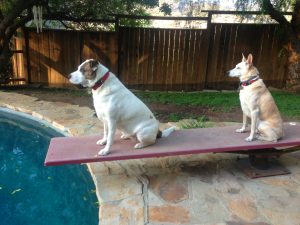
Frequent, short training sessions that are fun for all parties make for more effective learning © Susan Nilson
All dogs can learn amazing things. Sometimes it’s us (maybe more than sometimes!) who don’t allow our dogs to fulfill their full potential, for whatever reason – time, other commitments, know-how etc. I want to look at a few things here that can help you make your training work better, just little things that will make that difference.
Use Positive Power
This one kind of goes without saying! If you’re battling with your dog, using punishment, chastising him and relying on aversives, then you’re only serving to cause fear and pain. If, on the other hand, you train using positive rewards, you intrinsically and neurologically capitalize on your dog’s huge desire to learn via the dopamine release in his brain. Dopamine is a neurotransmitter which is released when good things happen. It helps the dog feel good, and helps him focus, learn better and remember what you are teaching him — and surely that is so much better.
Rewards For Individuals
Think carefully about what motivates your dog. Just because your friend’s dog loves treats, it doesn’t mean so should yours. Dogs always have some motivation, it just isn’t all that obvious sometimes – play of various forms usually based upon innate breed characteristics, praise, food (higher or lower value), scents etc. If you do not take the time to find that motivation especially if it is not immediately obvious, then training will be harder.
Set Up For Success
Never set your dog up to fail. Think about how good it feels when you win or succeed, it’s the same for your dog. You want him to realise his potential, but that may take lots of baby steps, not giant ones, so reward each little step first. Don’t expect him to come back with lots of distractions – he will fail, you don’t want this. Puppies struggle to listen with lots of social competition, it’s normal, so don’t give yours a hard time when he won’t focus when other pups are in his space. Give your dog space and gradually increase the level of distraction.
Pick Your Time
If you’re feeling frustrated or tired, then that isn’t the best time to begin a training session! Don’t feel that you need to have regimented training times, be flexible and wait until you’re feeling more relaxed or your tension will transmit to your dog.
Be Flexible
I never recommend to my clients to pick specific training times. I always suggest building training into walks, playtimes, playdates with friends etc. That way dogs are relaxed and learning happens better – it’s fun.
Make It Easy
Building on the above, make training work around you. Work sessions in around a coffee break during the day, TV Ad breaks or any time you’re just relaxing for a moment at home, just make it easy and convenient for you.
Keep Sessions Short
There is no need to train for hours on end! Short but frequent sessions will produce more effective learning.
Keep Sessions Fun
Try to ensure your sessions are relaxed, informal and that you have a good time. If there are more than 2 family members involved with the dog, I will always try and build lots of fun games into training – I always try and think games games games rather than boring old drills.
Have Realistic Expectations
I think a lot of owners do expect a little too much, too soon. OK, great to want to get on with training and learn, but understand that Rome wasn’t built in a day. Behavioural or training issues will simply not be solved in a day or a week or even a few weeks and you shouldn’t expect this to be the case nor be disappointed or feel that your dog is somehow abnormal because the issue isn’t solved quickly. Solving an issue depends on so many factors; the individual dog, severity of the issue, owner available time, owner commitment, ability to successfully apply the new strategy, liaising with the trainer/behaviourist etc.
Be Happy!
Dogs read our facial expressions, so actually look happy and be happy! Watch how your dog will mirror your own relaxed, playful joyful body language and respond to a welcoming, soft and varying tone of voice. Your training results will be far more productive if you keep the happy and ditch the glum!
Remember It’s Tiring
Training can be mentally exhausting, especially for younger dogs, so make sure they have adequate time to rest and assimilate what you are teaching them. Don’t be surprised if they want to sleep longer – it’s a lot of brainpower!
The most important thing to remember is that training should be fun, for you and your dog. If there’s bumps in the road along the way, seek qualified, professional help but see that as part of your journey together and enjoy solving those too!
